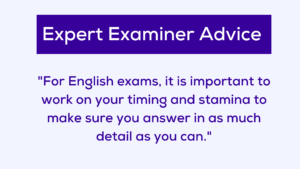Do you have important exams coming up? Here are 5 top exam revision tips for GCSE English Literature that are guaranteed to have you feeling prepared to sit any assessments.
Where should you start with revision for GCSE English Literature?
Revising for your GCSEs doesn’t have to be overwhelming or stress-inducing. Having a solid, structured plan in place and understanding useful revision techniques will help you to feel calm and collected throughout the revision period. Whether you are revising for mock exams, in-class assessments or the real GCSE you can follow these 5 top exam revision tips to improve your GCSE English Literature grade.

Why do students find revising GCSE English Literature difficult?
Some students find revising for GCSE English Literature difficult, as unlike a subject such as Maths, it requires you to apply your skillset, not just know a method or way of answering a question. Alongside this, students are also expected to understand a lot about multiple texts: characters, context, themes, language and structural devices (to name just a few!). However, revising for GCSE English Literature doesn’t have to be overly complex. Forward planning and using effective techniques can help to improve your grade and boost your confidence.
Follow these 5 top tips to bring structure to your revision and support your learning.
1. Start by identifying weak areas of knowledge or skill
- Go through your exercise book
- Work out which assessment types you did least well on
- Are your reading skills solid, but your writing skills need some extra work?
- Imagine that any potential exam paper will be full of questions you don’t feel confident about. Then, begin to work on those skills and knowledge. After spending time practising those specific skills or elements of knowledge you will feel more confident.
2. Structure your Exam Revision
- Create a draft timetable for yourself
- Once you’ve worked out where your emphasis needs to be placed, you can structure a revision timetable around this.
- The sooner you do this, the better!
- Trying to cram a lot of last-minute information in the night before is definitely not an effective revision method. Slow and steady definitely wins the race!
3. Work through GCSE English Literature past papers and ask for feedback
- Using past papers is a very effective form of revision
- Begin by working through past papers and writing an answer to them
- Then ask your teacher to mark them and give you feedback
- You can also look at the other work you have completed in class and use that feedback to improve your answers

4. Top tip for exam revision: Use revision cards or post-it notes
- Depending on the subject you are revising for, you can create revision cards or post-it notes to help prompt your memory.
- When revising GCSE English Literature it is a good idea to create timelines. This will help you to remember the key events of the play or book.
- Create mindmaps for each character.
- You can chart their development as well as recording key quotes you could use in an essay discussing them.
- Revise the key themes of the play.
- Using the mindmap technique here can be very useful.
- We recommend including good, short, memorable quotes for each of the themes you want to discuss in the mindmap.
5. Try the two-stage approach for GCSE English Literature
What is this top exam revision tip? Well, we’re glad you asked.
- Firstly, answer an exam question with no notes or books in front of you to help.
- See how much you actually remember testing your retrieval practice of information!
- Then go back to your in-class and revision notes, as well as looking at the text.
- Use this information to add in any bits you forgot to include when you answered the question.
- Top tutors tip: Add these new bits of information into your work in a different colour. This will help you to remember the notes more vividly.
Overall, revising for any of your GCSEs doesn’t need to be an unachievable and overwhelming task. The key to top exam revision is getting organised early. Use these 5 top exam revision tips to improve your GCSE English Literature and incorporate them into your revision plan. Good luck in your studies!
For more FREE revision support for GCSE English sign up to our 8 Week Boot Camp and get weekly English advice delivered to your inbox!


